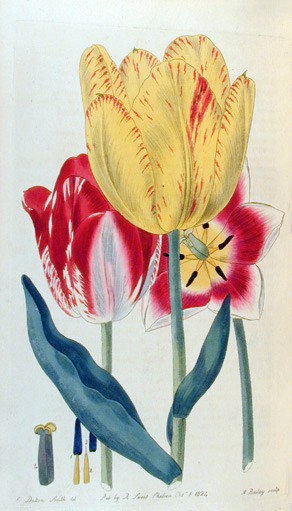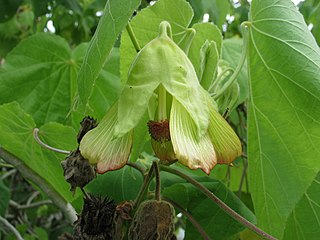
Abutilon is a large genus of flowering plants in the mallow family, Malvaceae. It is distributed throughout the tropics and subtropics of the Americas, Africa, Asia, and Australia. General common names include Indian mallow and velvetleaf; ornamental varieties may be known as room maple, parlor maple, or flowering maple. The genus name is an 18th-century Neo-Latin word that came from the Arabic ’abū-ṭīlūn, the name given by Avicenna to this or a similar genus.

Abutilon × hybridum is a species name used for a wide variety of different types flowering plants of uncertain origin in the genus Abutilon. Because of the uncertainty surrounding the name, they are often considered a cultivar group: Abutilon x Hybridum Group or Abutilon Hybridum Group. They are cultigens, not occurring in the wild. As with the larger genus Abutilon generally, they have been referred to by the common names Chinese lantern, and parlour maple.

Abutilon menziesii, known as Koʻoloaʻula in Hawaiian, is an endangered species of flowering shrub in the mallow family, Malvaceae, that is endemic to Hawaii.

Abutilon pictum, syn. Abutilon striatum (disputed), is a species of flowering plant in the family Malvaceae. It is native to southern Brazil, Argentina, Paraguay and Uruguay. The plant has become naturalised in Central America, and is used in horticulture. Common names include redvein abutilon, red vein Indian mallow, redvein flowering maple, Chinese-lantern and red vein Chinese lanterns.

Abutilon theophrasti is an annual plant in the family Malvaceae that is native to southern Asia. Its specific epithet theophrasti commemorates the ancient Greek botanist-philosopher Theophrastus. Abutilon theophrasti is the type species of the genus Abutilon.

Robert Sweet was an English botanist, horticulturist and ornithologist.

A schizocarp is a dry fruit that, when mature, splits up into mericarps.

Abutilon indicum is a small shrub in the family Malvaceae, native to tropical and subtropical regions. This plant is a valuable medicinal and ornamental plant, its roots and leaves being used for curing fevers. It has been widely introduced outside of its native range, and is considered invasive on certain tropical islands.

Abutilon eremitopetalum, commonly known as the hidden-petaled abutilon or hiddenpetal Indian mallow, is a species of flowering shrub in the mallow family, Malvaceae. It is endemic to dry forests and low shrublands on the windward side of the island of Lānaʻi in Hawaii. It is classified by the IUCN Red List as critically endangered by habitat destruction. The species was first discovered in 1987.

Abutilon sandwicense, commonly known as the greenflower Indian mallow, is a species of flowering plant in the mallow family, Malvaceae, that is endemic to the island of Oʻahu, Hawaii, in the United States. It inhabits dry forests on the slopes of the Waiʻanae Range at elevations of 400–600 m (1,300–2,000 ft). Associated plants include lama, ēlama, māmaki, kalia, āulu, olopua, and alaheʻe. Greenflower Indian mallow is a shrub, reaching a height of 1.5–3 m (4.9–9.8 ft). It is threatened by habitat loss.

Abutilon julianae is a small shrub of the genus Abutilon believed endemic to Norfolk Island and nearby Phillip Island.

Abutilon palmeri, known as Palmer's abutilon, superstition mallow, and Palmer's Indian mallow is a species of flowering plant native the Southwestern United States and northwestern Mexico.

Abutilon grandifolium, the hairy Indian mallow, is a large shrub that is up to 3 m (9.8 ft) high with broad, 3–18 cm (1.2–7.1 in) leaf blades. Flowers are axillary, with a yellow corolla 2–3.5 cm (0.8–1.4 in) across, composed of petals 1–1.5 cm (0.4–0.6 in) long. The fruits are ovoid-globular schizocarps that are 1–1.5 cm (0.4–0.6 in) in diameter and composed of ten shortly beaked mericarps, containing 2-3 seeds each.
Abutilon listeri , commonly known as the lantern flower, is a tropical shrub in the Malvaceae or mallow family. It is endemic to Christmas Island, an Australian territory in the north-eastern Indian Ocean. Its specific epithet honours British zoologist and plant collector Joseph Jackson Lister, who visited the island on HMS Egeria in 1887.

Abutilon pitcairnense, the yellow fatu or yellow fautu, is a critically endangered perennial plant that is native to Pitcairn Island. It was once considered extinct, until a single plant was discovered on the island in 2003. At that time, cuttings and seed were used to propagate several plants at a nursery on the island and botanical gardens in Ireland and England. The last wild surviving plant died in a landslide in 2005, making the plant extinct in the wild.

Abutilon fruticosum is a widespread species of flowering plant in the mallow family known by the common names Texas Indian mallow, pelotazo, and sweet Indian mallow. It is native to Africa, southern and southwestern Asia, northern Mexico, and the south-central United States.

Abutilon mosaic virus (AbMV) is a virus of the genus Begomovirus. It infects Abutilon species, notably the flowering maple, Abutilon striatum. The mottled or variegated effect on the leaves of Abutilon striatum is sought after.

Abutilon otocarpum, the desert lantern, is a small shrub of the family Malvaceae found in most parts of Australia.

Abutilon oxycarpum, known as flannel weed, straggly lantern-bush, and small-leaved abutilon, is a malvaceous plant native to eastern Australia. It is found on hillsides or floodplains on red sand and limestone.


















